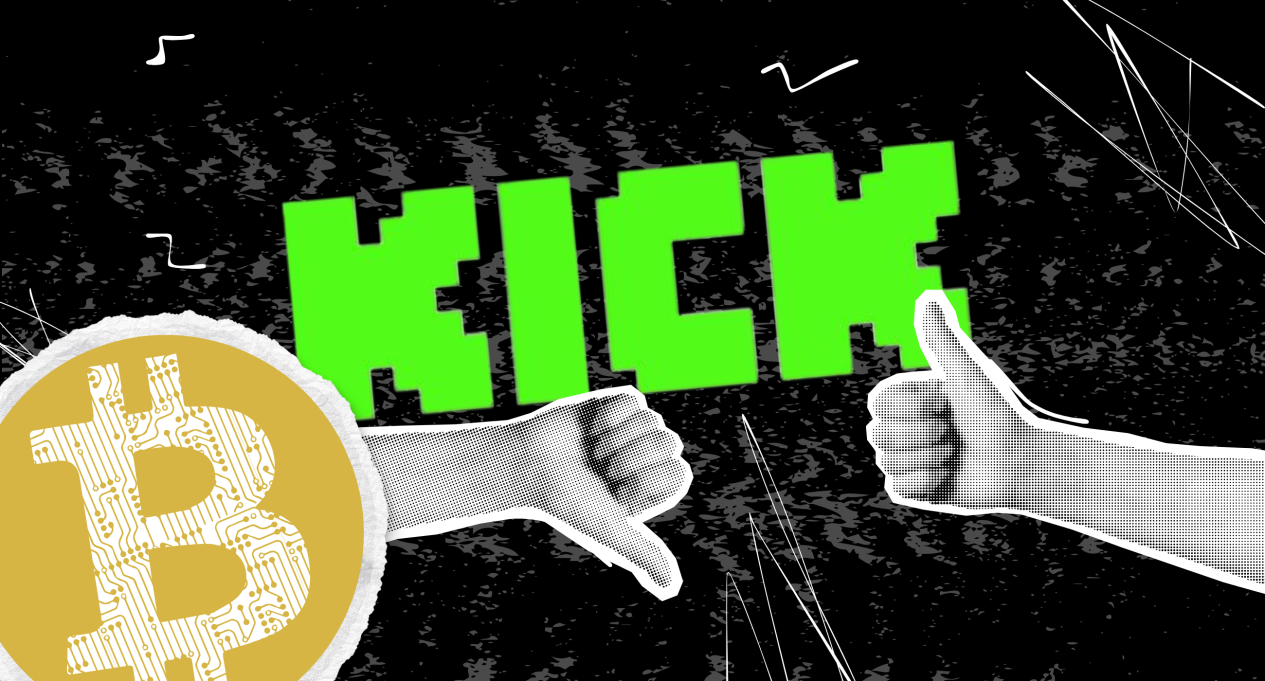
Please Note: This article may not be appropriate for younger readers and includes sensitive topics that some people might find difficult. Please visit our Resources Page for help.
Ever fancied visiting the Wild West of live streaming? Enter Kick, the metaphorical love child of Gab Social and Twitch.
Emerging in 2022 as an unconventional live-streaming platform, Kick operates on loose community guidelines, ‘free speech’, and a suspiciously generous compensation programme: creators are given 95% of the income they generate. Fabulous if you want to earn an extra buck, but at what price?
Let’s explore.
Kick’s Values
A quick scroll through Kick’s Community Guidelines reveals they are not a fan of strict rules.
They claim that ‘punitive’ measures are not the answer to harmonious content creation and instead work ‘collaboratively’ with creators to understand actions, intent, and potential remediation (although it’s unclear how this is done). Clever wording allows the Guidelines to cross over into murky free-speech territories – opposing cancel culture and promoting ‘constructive dialogue’.
“We value the importance of constructive dialogue over knee-jerk reactions often associated with 'cancel culture'.” – Kick Community Guidelines
So-called synergetic approach aside, Kick acknowledges that it can get ‘rowdy’, perhaps fostering a contentious audience by subtly warning the more cautious person away from the platform. Despite this, it wasn’t until a year after Kick’s launch that a report button was introduced (users previously only had the option to report via email) – meaning that for a long time, creators could stream damaging content with little to no retribution.
“Occasionally, Kick can get rowdy, reflecting the lively and spontaneous nature of our live-streaming community. If you insist on having total control over your environment at all times, you will likely have a tough time on Kick.” – Kick Community Guidelines
Kick is also known to poach, nurture and even sponsor creators banned from traditional streaming platforms. Indeed, controversial figures, including Aidan Ross and Fousey, joined Kick following various spats with Twitch over their content. Kick promotes problematic streamers while committing to a ‘safe and enjoyable experience for all’ – definitely contradictory – but why? For a company that only a year ago admitted its lack of profitability, we wonder if its preference for hot-tempered characters is a deliberate strategy to drive traffic to the site; after all, the most controversial streams are the most enticing. Extreme sexualisation, sexual harassment, violent language and misogyny are all rampant on Kick, even though the platform deters creators from ‘Adult Body’ display, sexual services and suggestive camera angles. Harmful content can be viewed without an account and is often displayed on Kick’s homepage, with no searching required. While creators transgress the Ts and Cs of other streaming platforms (like Twitch) by creating borderline sexual content, Kick’s lax attitude towards rules makes bad behaviour even worse – almost as if creators want to test how much they can get away with.
“There is to be no solicitation of sexual services and be mindful of certain camera angles, including extreme close-ups featuring grinding motions, over-caressing of genitals, and overly suggestive depictions of oral, anal, and vaginal activities, as well as the expulsion of sexual bodily fluids.” – Kick Community Guidelines
Links With Gambling
You don’t have to look further than Kick’s founders to understand its strong links to gambling. Ed Craven and Bijan Tehrani are the billionaire owners of crypto and betting site Stake.com, which was banned in October 2022 from appearing on Twitch following a gambling crackdown. Only a couple of months later, the entrepreneurial duo – alongside streaming personality Trainwreckstv – created Kick.
Experts have criticised Kick for existing as a Stake advert designed to reach a broader (younger) demographic. This seems a reasonable observation, only made worse by Stake’s sponsorship of Kick streams and its multi-million dollar seduction tactics. In October 2023, gaming streamer Nickmercs announced an eight-figure contract with Kick to his 6.7 million Twitch followers. The catch? A contractual obligation to run gambling streams.
So, Kick may or may not be a front for gambling endorsement. But what about additional content? What’s it like? Is it an innocuous community of streamers unsatisfied with other platforms, or more harmful than that?
What We Witnessed
We spent some time on Kick to properly understand what was happening on the platform, uncovering some alarming themes that need to be brought to the attention of decision-makers and those considering allowing their children on the platform.
Treatment Towards Women
Adin Ross, one of the most subscribed streamers on Kick and openly anti-LGBTQIA+, will often push radicalised and sexually charged content to his followers. Ross is the golden goose of Kick; he was one of the first to be poached from Twitch and is frequently handed a Get Out Of Jail For Free card even after controversies such as streaming the Super Bowl and porn to his mostly underage audience. We found streams of Ross video-chatting with girls in underwear; commenting on their looks, and, at one point, pressuring two female roommates to hook up. Some of this inappropriate content is a product of Ross deliberately testing the boundaries of the platform. By creating a ‘do what you want within reason’ policy, streamers are challenged to see if Kick really is the Wild West-style streaming utopia that edgier creators have been calling out for.
And Ross, sadly, isn’t a one-off. There are lots of problematic streamers gracing Kick with poor treatment towards women.
Colombian streamer Westcol is known to degrade and sexualise countless women on his streams. We observed content that included sexual gestures, mounting, lap dancing, sex noises and grinding – some of which did not have an 18+ warning. Elsewhere, American streamer Stackswopo* spouts vile, racist, antagonistic content to his 127.5K followers, including streaming from Monkey: a video chatting platform that pairs strangers together (much like the now-deceased Omegle). Misogynistic and abusive comments were frequently made towards women (and sometimes girls) on Monkey – including references to rape and suicide.
“Slut a** w****, shake that a** you dumb light-skinned b****.” – Stackswopo
“You’re not strong, you’re a woman. Women are soft and feminine, they get raped. You dirty ass b**** kill yourself.” – Stackswopo
On one occasion, we observed Stackswopo pressuring a young woman into showing her breasts on camera. Later we saw an incident which involved a sexually charged interaction with a (potential) minor. While he can’t prove her age, the comments accompanying the stream warned Stackswopo to ‘age-check’ the girl while others typed ‘KID’ in all capitals. One comment claimed she was as young as 13.
Women Sexualising Themselves For Profit
While most streamers on Kick are men, there are women on the platform as well – with many promoting sexualised content. Female streamer Amouranth almost exclusively posts NSFW underwear or hot tub content, including the suggestive use of bananas, showering with other women in lingerie and playing ‘twister ultimate’. Her videos are often accompanied by highly sexual titles such as ‘For the horny men’ and ‘sexual moaning’ – somewhat shocking when you consider Kick’s rules against “overly suggestive depictions of oral, anal, and vaginal activities… and continuous overt sexual movements.”
Gambling
Kick may have strong links with gambling, but what does it look like in practice? Trainwreckstv, streamer, podcaster, and co-founder of Kick, regularly streams gambling content from Stake, which, as we know, is a gambling platform owned by Kick’s second and third founders, Ed Craven and Bijan Tehrani.
Strangely, despite his relationship with Kick, Trainwreckstv clearly positions anti-gambling messages from his ‘About’ page, with text that includes, “Bottom line, don’t gamble, but if you’re stupid, then”, followed by a list of steps to help people gamble responsibly. It begs the question: if he knows that gambling is harmful, why does he stream it? Is it required as part of a partnership with Craven and Tehrani – two of the biggest gambling moguls?
In one video, Trainwreckstv wins over 400,000 bitcoin (67,000 USD) on Razor Shark, one of Stake’s slot games. Landing on such an absurd amount of money is extremely rare, and certainly not something to advertise. Is it a coincidence that Kick’s co-founder secured a life-changing win? Was the game rigged? Is it a tactic to draw others into the gambling world? We won’t ever know for sure.
Disrupting The Peace
Kick also has several instances of streamers causing a nuisance in public, including YouTuber and streamer Johnny Somali (real name Ismael Ramsey Khalid), who is known for trespassing and harassing locals in Japan.
We found instances of Khalid playing loud, offensive music on public transport, acting indecently with a traffic cone and shouting racist slurs at passers-by. On one occasion, a stranger pushed Khalid away after being approached and prodded without consent. Khalid followed the stranger through an underpass, shouting, “You better back the f*** up.”
Khalid’s antics eventually caught up with him, though, and the streamer has since been arrested and charged after causing a scene at a restaurant. He has ‘promised’ not to film any more videos in public – but whether that happens remains to be seen.
Conclusion
The tightening of rules on traditional streaming services means challenger platforms like Kick will continue to crop up.
While there is arguably a place for slackened guidelines in 18+ spaces, parents, teachers, and youth workers should be aware that Kick is not suitable for children. Many streamers migrating to Kick have an underage audience, yet the edgy nature of the platform means one innocent creator is instantly countered by a controversial one. You don’t have to spend much time on the platform or dig deep to find harmful content either; the front page is full of unsuitable yet easily accessible content that a minor should never view – made worse by the fact that you don’t have to create an account.
Kick claims to prioritise free speech; but we know that can quickly mutate into hate speech when not appropriately regulated. Plenty of the content on Kick is utterly hateful towards women and minority groups, only worsened by its blatant favouritism of troublesome characters and turning a blind eye to unacceptable behaviour in favour of clicks and views.
There is, however, one positive. Kick’s creator profit ratio is good, far superior to better-established platforms (like Twitch and YouTube) that take a large cut of a creator’s earnings for themselves. But is there a second price to pay? We are concerned that Kick is just a shop front for Stake, designed to tempt fans into gambling at a time when other streaming platforms are tightening their rules.
We strongly advise Kick to hide 18+ content from users browsing the site without an account. That extra step might help shield at least some of the harmful and hateful live streams that grace its homepage – age verification could, perhaps, be considered later.
Finally, parents should know that Kick and other live-streaming platforms are much harder to regulate and control. This does not mean that all live content is bad and should be avoided, but it does mean that children need the correct media literacy skills to report, recover and flourish.
Want to learn more about Kick and its impact on children and young people? Contact info@voicebox.site to book a briefing session.
* Stackswopo's account on Kick has been taken down, and their content removed from the platform
Support Young Creators Like This One!
VoiceBox is a platform built to help young creators thrive. We believe that sharing thoughtful, high-quality content deserves pay even if your audience isn’t 100,000 strong.
But here's the thing: while you enjoy free content, our young contributors from all over the world are fairly compensated for their work. To keep this up, we need your help.
Will you join our community of supporters?
Your donation, no matter the size, makes a real difference. It allows us to:
- Compensate young creators for their work
- Maintain a safe, ad-free environment
- Continue providing high-quality, free content, including research reports and insights into youth issues
- Highlight youth voices and unique perspectives from cultures around the world
Your generosity fuels our mission! By supporting VoiceBox, you are directly supporting young people and showing that you value what they have to say.





